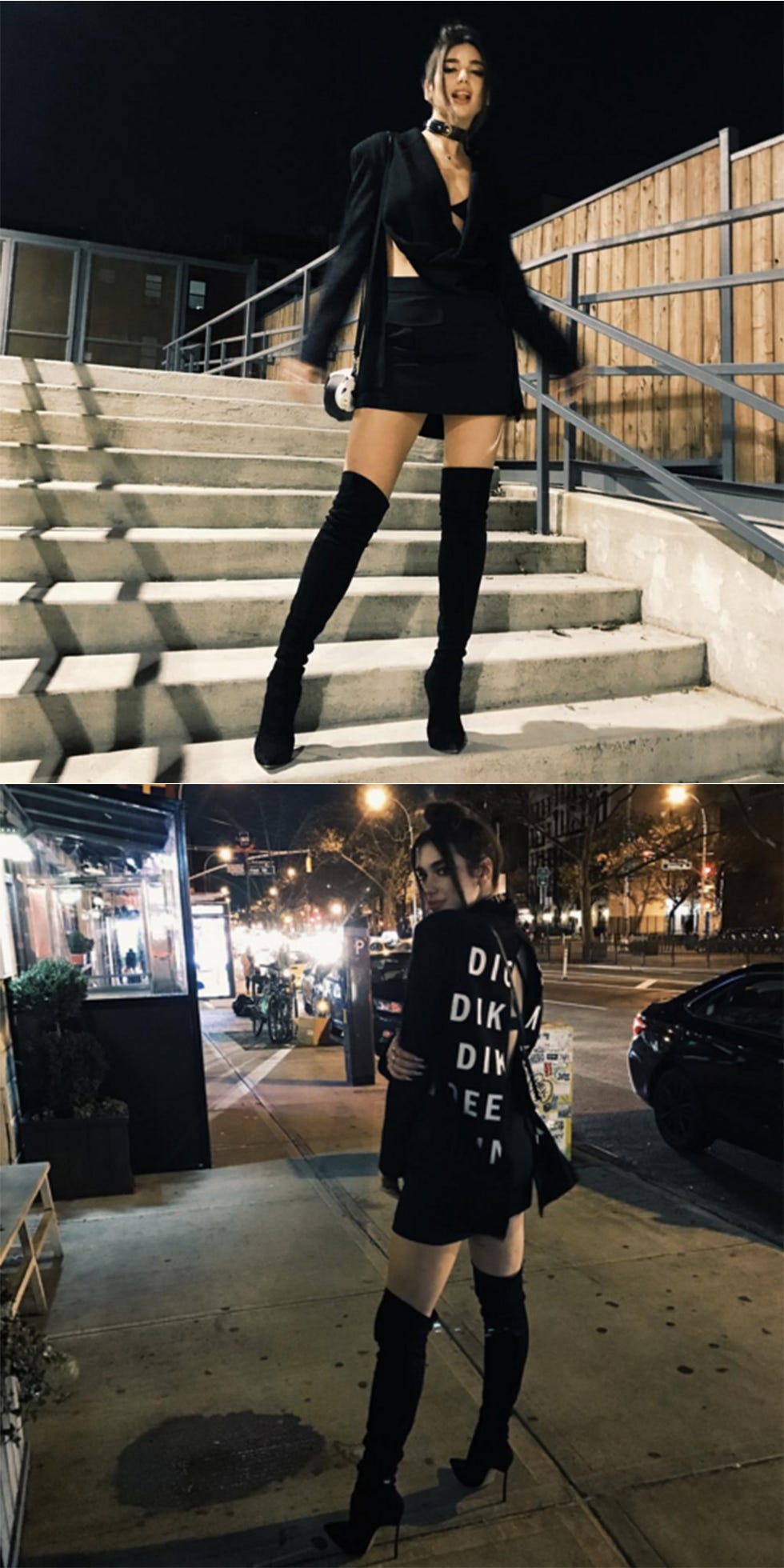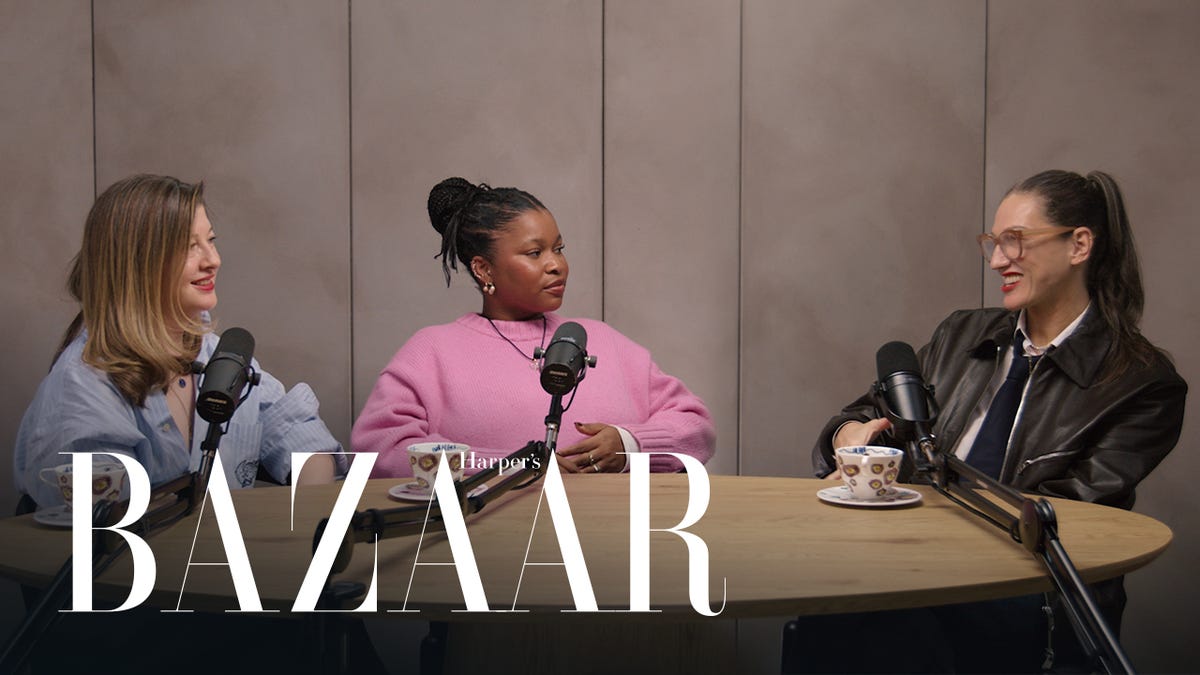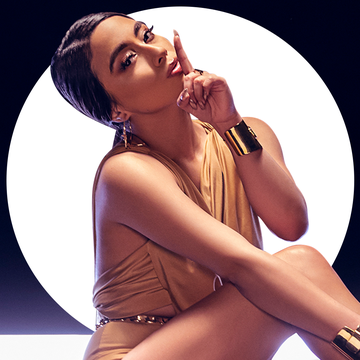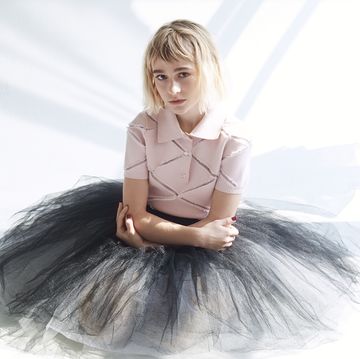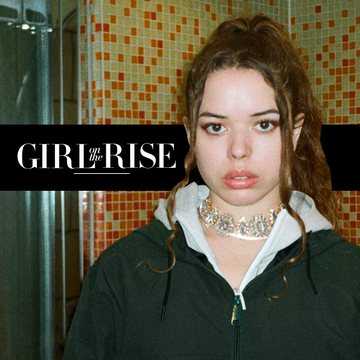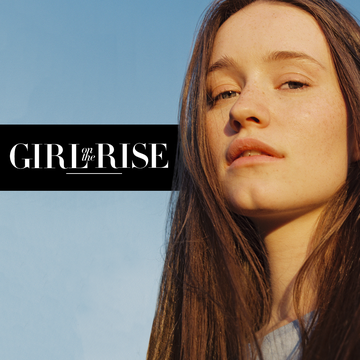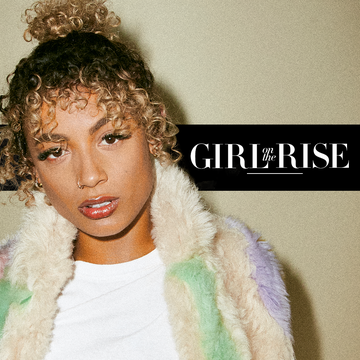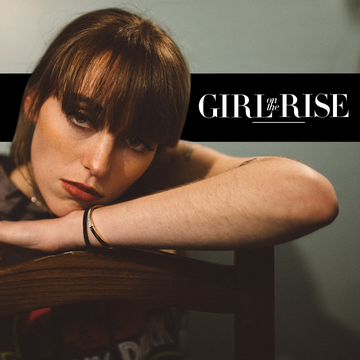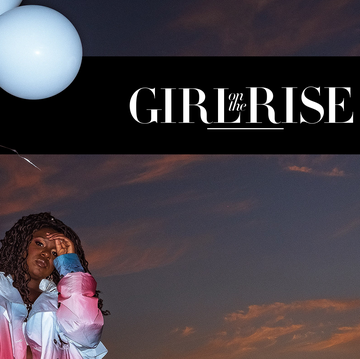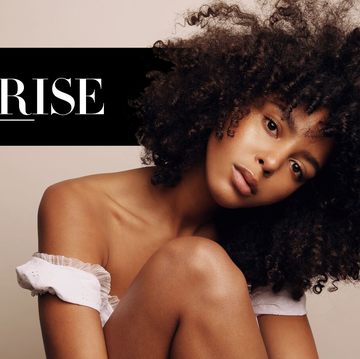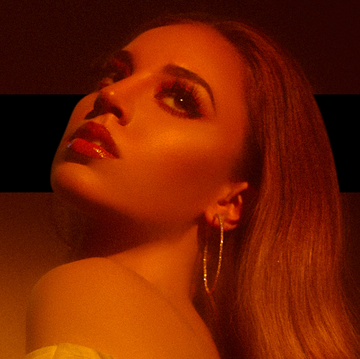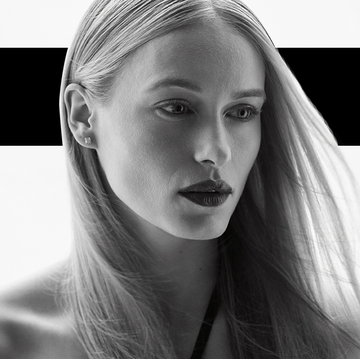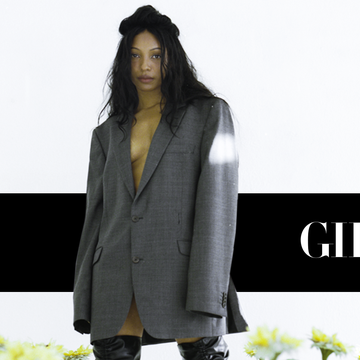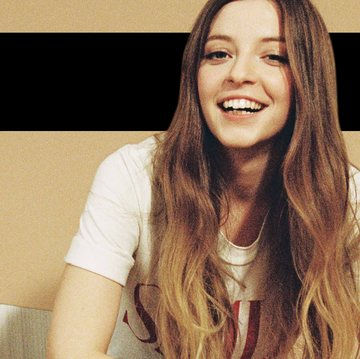Welcome to Girl Rising, our recurring interview series featuring our favorite newcomers on the verge of stardom.
Dua Lipa has a striking sense of style—she walked into our interview in a cut-out DKNY blazer with an open back, bra peeking from the deep neckline, a mini skirt and over-the-knee stiletto boots—but I was focused on the tiny Keith Haring tattoos on her thumbs. One dancer on each hand. The UK-based singer explained they're more than body art; they're a tribute to New York City, her "favorite place in the world after London." The irony, however, is that she got the ink in Los Angeles.
Lipa was born and raised in London, moved to Kosovo when she was 11, and then moved back to London at 15. And she's done a lot more traveling during her rise on the music scene. "I've seen so many different places that I've never been to before," she told Bazaar.com in December, reflecting on her past year.
The 21-year-old gained traction in Europe after releasing her first singles in the fall of 2015, but she didn't break onto US charts until her track "Blow Your Mind" dropped in August 2016. Since her debut, she's had her own tour in Europe and the UK, opened for Troye Sivan and became a runner-up for the prestigious BRIT Critics' Choice Award this year. "I've never done the same things two days in a row, which is good for a start," she gushed over her recent success. And she hasn't even released an official album yet—it's coming soon.
Lipa, whose music is often labeled as "dark pop," boasts deep and sultry vocals, an unexpected sound for a young artist, that float right over her dance-influenced tracks. At times, she playfully sing-songs lyrics, as she does in the chorus of "Blow Your Mind," which she picked up from her obsession with rap; but she can also pull at the heartstrings with an acoustic ballad like "Thinking 'Bout You."
Below, the singer opens up about her upcoming debut album, her love for hip-hop and what modeling in her early teens taught her about stardom.
HB: Where are you right now in the development of your debut album?
DL: The album's done. I'm hoping to get maybe some special guests on it, but it's kind of coming pretty close, crunch time, and I don't have anyone on it yet, because I haven't been that focused. I've been on tour so much and doing some things that I haven't had the opportunity to find someone that would fit a few songs that I have in mind. So, who knows? I don't know what will happen until then, between now and February, but it's gonna be exciting. I'm really looking forward to it. It's been a long time coming.
HB: You've been working on it for over a year.
DL: Kind of like two years now. And there's been a lot of back and forth in those two years. There's been a lot of me finding who I am as an artist and my sound and everything. I think now I know exactly what I want and how I want it to sound and what I want the finished album to be.
HB: So what is that? What is it that you wanted and found?
DL: It's just been my baby forever. For me, sonically, I wanted it to sound like it all still comes from the same place. I found a producer that I love working with, Koz, that did all the additional production on the album. That was fun because it made everything easier. I would send stuff to him that was just piano, and he'd come back with production, and it would all just gel better together. It's just little things like that that add something to this whole creative process that makes it feel like a whole body of work.
HB: In the process of writing, how do you approach a song?
DL: Most of the time, it's stuff that's already in my mind, I'm like, "I want to write about this," or, "I have this verse idea and this came from this," or some days, I go into the studio and I feel like I want to make a story up. And while I'm writing, I slowly realize how much that song has relevance to what's actually going on in my life; it was something that I wasn't able to get out. Like, I would tell the people in the room what I was feeling, but somehow in my subconscious channel it was as if it had happened to someone else, which is always interesting. I feel like I've learned a lot about myself this whole year and a half. And things that I've kept bottled inside me have come out in music.
HB: One thing that's distinctive about you is your sound, and not just your singing voice, but also how you talk-sing certain lyrics. Was that always intentional, or did it just kind of come out while you were in the studio?
DL: I always wanted the flowiness that hip-hop artists had. I always admired how they rapped so fast, but I never wanted to rap, I wanted to sing the rap. It was always intentional to try and include something like that, and in some songs, it's really apparent, like in "Last Dance" where there are faster-paced lines and stuff, and it's also in a song that's unreleased called "Bad Together," you also see a lot of that.
HB: Did you grow up listening to a lot of hip-hop?
DL: When I moved to Kosovo at the age of 11, everyone over there listened to a lot of hip-hop. Everyone loved Tupac and Biggie and were really, really obsessed with them. I think my first obsession was 50 Cent and Tony Yayo and G-Unit in general. My first concert was Method Man and Redman, because they came down to Kosovo. I saw Snoop Dogg, too.
HB: What about now? Who are you feeling currently?
DL: Now I love J. Cole, I love Kendrick Lamar. I like A$AP Rocky.
HB: Your father was also a musician. Was that the reason why you wanted to go into music?
DL: My parents never pushed me towards music. I feel like growing up in a musical household and always being surrounded by it, I was always kind of a performer child. I remember my parents would have guests over and they would bring their kids and I would make sure that we were ready to put a show on. I was like, "Okay, everybody stop your conversation. We're coming to do a show." It was something that I always loved to do. It was kind of inevitable, I guess, my love for music. I've always been so in love with it and so inspired by it from making shows in the living room and doing dance routines in the school playground to like, "1, 2 Step" by Ciara and Missy Elliott.
HB: What kind of role have your parents played in your music career now?
DL: They're so supportive for everything. They come to so many shows and they travel here and there when they can. I mean, there was a point when I decided not to go to university when my parents were like, "Are you f*cking kidding me? Are you sure you don't want to go to university?" Because this was such an unknown territory and you never really know what happens. I guess they were probably scared and they didn't really know what was going on, so they were like, "Are you sure you can't do uni and music at the same time?" And I'm like, "I really have to focus on just music, let me take a year out." And I ended up from a gap year to a gap life. I was like, "F*ck this, I'm not going back."
HB: What has it been like transitioning as a star from the U.K. to the U.S., from a rising artist's perspective?
DL: I think now especially, I feel like the music industry's changing a lot. Streaming is really dominating the world, and that can also be a bad thing for young artists that don't really have a fan base, but it can also be a really good thing for young artists that have a chance to be discovered. So it gives me an opportunity to make more fans over here in the U.S. because you no longer have to take a song to radio. Like, fans in the U.S. will hear them before they come on the radio now because of streaming.
HB: Since you're still young, how are you making sure you stay in control of your music and your image?
DL: I've always been very much in control of my music and my image and I think one of the things I've been lucky about is I didn't bring a label on board until I really figured out who I was. I just needed to find a team that believed in my idea and my dream, and that made things way easier because I never had to deal with the thing of people wanting to change me or wanting to make me sing songs that aren't really for me because I already had such a clear idea of what I wanted to do. I guess now I'm a bit too far down the line for anyone to try and tell me something. To try and change my image, it's just not gonna work. From the beginning it's always been something that I feel comfortable in. I just want to be real, and I feel I owe that to my fans and to myself. At the end of the day, I worked so hard to get who I am out there and not a manufactured something that somebody else wants me to be. That's one of the things "Blow Your Mind" is about, it's about being proud of who you are and if someone wants to change you or make you fit a certain criteria or a certain box because society tells you to, it's like a massive "Fuck you" and "If you let me be who I want to be I'm gonna blow your mind."
HB: And you have that snarky little kiss at the end.
DL: Mwah! It's a bit catty.
HB: What was it like modeling as you were growing up?
DL: I got approached to do modeling when I was really young. I went there, but I was never the right size, I was never cut out to be a model and I never really got any real jobs. They were holding on to me for a while, and then they were like, "Oh you know, if you lose a lot of weight, we'll be able to put you out for more jobs." And it kind of put me in a really bad mindset—going back to the "Blow Your Mind" thing, this is where a lot of the inspiration came from—where I feel like I really tried to change myself in order to get somewhere. The reason why I thought modeling was a good idea was because I thought I could make loads of friends that could help me in music and that I could really push myself. Obviously, that wasn't the case. I'm really grateful that I did it because it was part of my journey to where I am now, but it also showed me a lot of what I wanted and what made me happy, and it wasn't that at all. Some people get it so wrong when they write and they go, "She had a really successful modeling career," I'm like, people don't understand that it really wasn't that. It was totally part of my journey, but it wasn't what helped me get to where I am.
HB: Can we just talk about your style? You show off some really cool outfits on Instagram and on stage.
DL: I like having one piece that makes a whole outfit and then you can wear everything else that's quite simple. Like right now, it's this blazer 'cause it's fucking weird. It's from DKNY. I've always loved dressing up. I like it when things look like you've just thrown them on and sometimes the things you really do just throw on look the best. I've always been inspired by the '90s, and I like wearing baggy trousers, and blazers with slip dresses and thigh-high boots or leather jackets, and just a mixture of all those together.
HB: Tell me about the tattoos on your hands. Are you a big Keith Haring fan?
DL: Yeah, I think that's another thing that ties me to New York that I'm obsessed with. I got these done when I shot my first-ever music video, "New Love." I just went around and I found this tattoo artist in L.A. and he did them for me, and they're my favorite. I love Keith Haring and I love what he stood for and I love that whole era. I wish I was living in the '80s and partying in Studio 54. It just seems like a really fun time.

